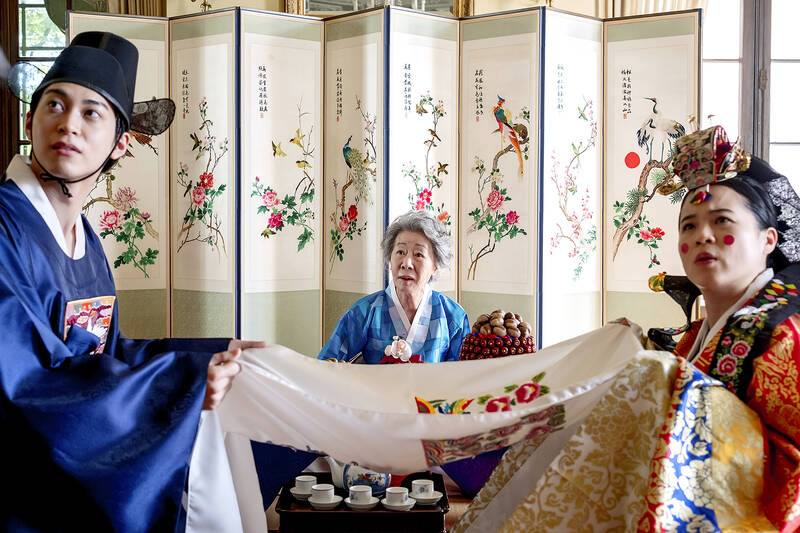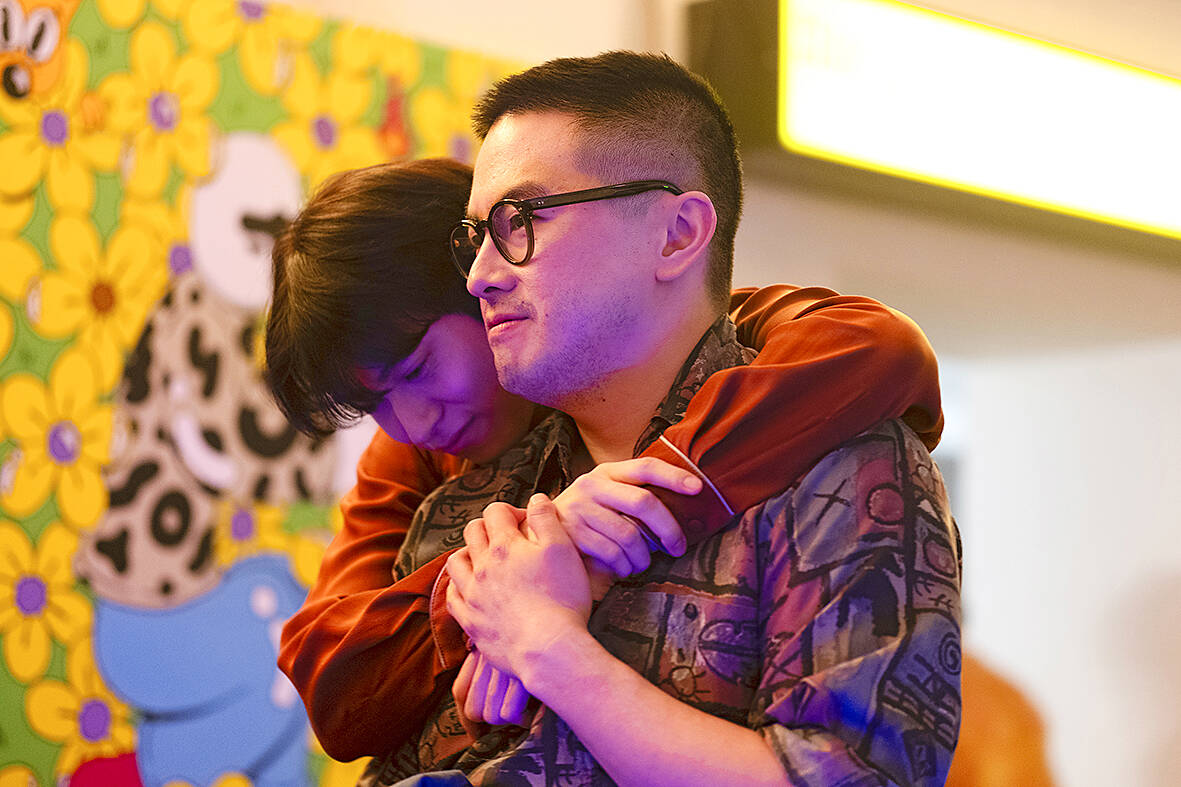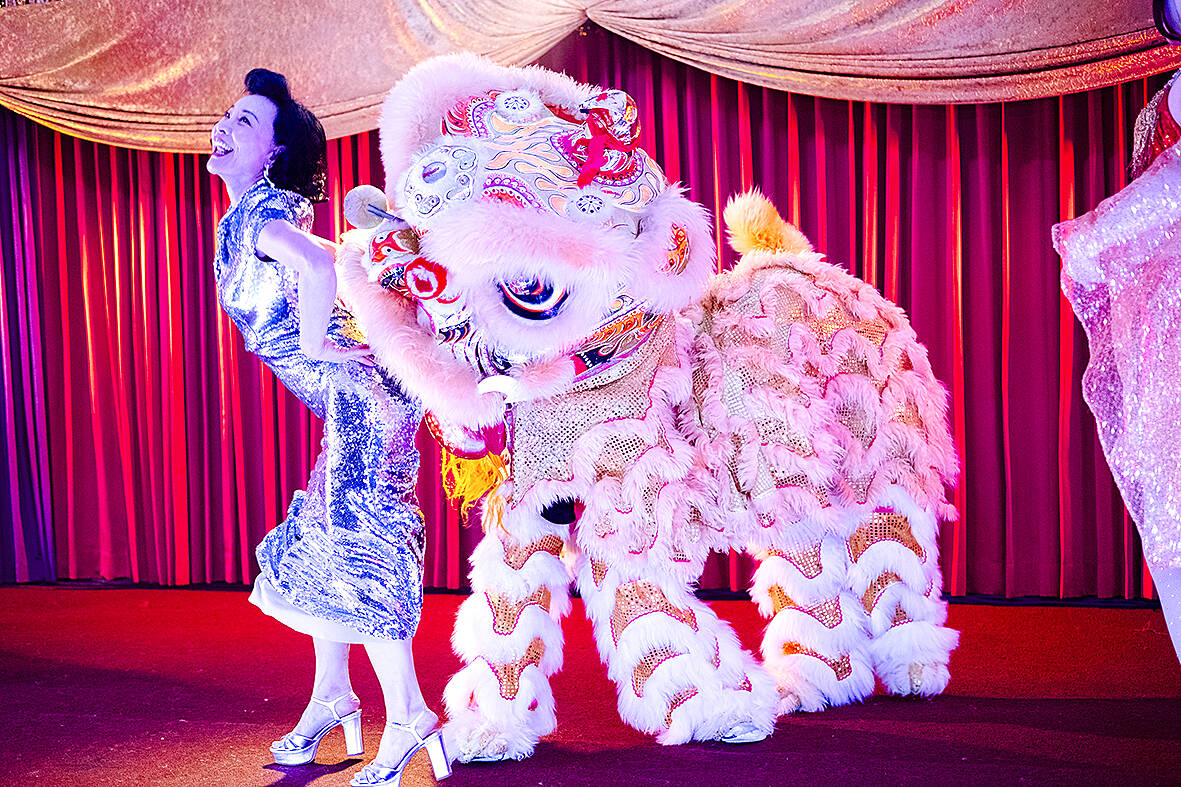The filmmaker Andrew Ahn grew up in what he calls “a Blockbuster Video family.” They would rent three or four movies every weekend. When Ahn was 8, his mom rented the VHS for Ang Lee’s (李安) The Wedding Banquet.
“She was like, ‘It’s this Asian movie that white people are talking about,’” Ahn remembers. “She rented it not knowing it was queer.”
Lee’s 1993 film followed a Taiwanese immigrant New Yorker (Winston Chao, 趙文瑄) who attempts to marry a woman (May Chin) to placate his parents and hide his gay partner (Mitchell Lichtenstein) from them. It was a still-rare gay, Asian American rom-com that became an Oscar-nominated landmark.

Photo: AP
When Ahn, 39, was approached about revisiting The Wedding Banquet, he was daunted. But, as the son of Korean immigrants, Ahn, whose movies include Driveways and Fire Island, felt like he had something to contribute.
“Throughout my career I’ve tried to explore this balance between sexuality and culture and family,” Ahn said in a recent interview over coffee. “I saw many gay films coming of age as a gay man where those things felt kind of siloed. Here, you could see how they were so intertwined. Watching it when I was 8 years old really set the bar.”
Ahn’s The Wedding Banquet, which opens in theaters on May 9, is the most personal of remakes. Even that word, “remake,” his collaborators avoid when talking about it. Ahn’s film, starring Kelly Marie Tran, Lily Gladstone, Bowen Yang and Han Gi-chan, revisits and rebuilds Lee’s queer comedy of errors for a new generation.

Photo: AP
“It started with a very simple proposition: Nobody is remaking The Wedding Banquet,” says producer James Schamus, who co-wrote both the original and Ahn’s film. “The only way this film gets made is if we reenvision and take inspiration from Ang Lee’s original movie. But the fundamental requirement was: It must be something new and it must be something of our time.”
Just as Lee’s film was, Ahn’s The Wedding Banquet is “something fixed in history,” as Gladstone says. A jubilant farce, radiant with queer love, The Wedding Banquet arrives 32 years later as both a big-screen symbol of what’s changed for LGBTQ people since then, and what hasn’t.
Made last year, The Wedding Banquet premiered at the Sundance Film Festival just a week after the inauguration of President Donald Trump ushered in new challenges for the LGBTQ community. That’s prompted Ahn and his cast to reconsider, and double down on, what this Wedding Banquet means for right now.

Photo: AP
“It’s creating a space where joy is an act of resistance,” says Gladstone.
“The joy of that community is under profound threat,” Schamus says. “You would say to yourself maybe: Is this the time to have a queer romantic comedy? Things are not that funny right now. The answer to that very reasonable question is: This is what you’re fighting for. That joy is profoundly important, for everybody.”
EXPANDING THE WEDDING PARTIES

Photo: AP
Ahn’s The Wedding Banquet centers not one couple but two. Min (Han) is in love with his partner, Chris (Yang), but, to fool his soon-to-visit grandmother (Youn Yuh-jung), Min tries for a sham wedding with Angela (Tran), their friend and housemate. She’ll earn enough money in the transaction to pay for her IVF treatment with her partner, Lee (Gladstone).
Here, the family traditions are Korean, not Taiwanese. The intergenerational relationships (also visiting is Angela’s mother, played by Joan Chen) have evolved. And the questions facing the couples — to marry, to have children — are much different than they were for closeted gay couples decades ago.
“The stakes in the original are placed in survival,” says Yang, the Saturday Night Live performer who also starred in Ahn’s Fire Island. “The sham wedding has to happen as a way to preserve this relationship that he has. To me, the thematic thing in this version is about community. It’s about roots. It’s about establishing a sense of place.”
Ahn’s antic yet sensitive film, set primarily around the Seattle home of Lee, a member of the Duwamish Tribe who purchased it to reclaim her family’s land, is a textured portrait of a careening and chaotic but deeply loving home. Ahn, whose previous films have been warmed by a gentle sincerity, creates a patchwork dramedy stitched together by the intimacies and uncertainties of its two couples.
‘THE FILM IS MOST LIKE ME’
For Ahn, much of the movie came straight from his own experiences, so much so that, he says, he takes critiques of the film personally.
“There are a lot of moments I’ve drawn from my life. The argument in the alley between Kelly Marie Tran’s character and Lily Gladstone’s character, and Kelly’s character says, ‘If it happens, it happens,’” says Ahn. “That’s something my boyfriend said to me the first time we talked about having kids.”
Tran, who came out publicly while make The Wedding Banquet, found herself playing a character unusually close to herself, and in a working environment unfamiliar to the Star Wars: The Last Jedi star.
“The whole crew and the whole cast being primarily queer wasn’t something I experienced before,” says Tran. “And I didn’t realize how healing that would be.”
Gladstone concurs: “Everybody who knows me well says that this film is the most like me of anything I’ve done.”
Yang, who was subjected to scientifically discredited “conversion therapy” as a teenager, says both versions of The Wedding Banquet correlate with something profound for him. He saw Lee’s film while in college, when he was concealing his sexuality from his parents. The film’s ending struck him as a kind of aspiration for him and his family. Maybe they could reach that level of understanding one day, he hoped.
“The movie ends on uncertainty but it still ends with this hug and it gave me this weird hope that if I could get to that point with my family, then things will be OK, then I could jump off from there,” Yang says. “So I have this personal check-in where I can chart the arc with my own family, where I’m now very transparent with them about that part of my life, where they’re asking me if I’m dating anybody, which I never thought would happen.
“It’s a pretty amazing benchmark for me.”
‘A HIGH QUALITY-OF-LIFE PROJECT’
Whether The Wedding Banquet will connect with audiences the same way Lee’s film did remains to be seen. But what’s already clear is that Ahn’s film reverberates with a spirit of tenderness and hope that will be sustaining for a wide swath of moviegoers. Gladstone, who signed onto it after her Oscar-nominated performance in Killers of the Flower Moon, refers to the film as “a high quality-of-life project,” and her co-stars hope the movie has a similar effect for its audience.
“It’s very complicated to be celebrating a community that’s also being persecuted at that very moment,” says Tran. “It’s a lot to hold and to acknowledge all of it. I’ve definitely had that experience before, not particularly with the queer part of my identity but with the Asian part of my identity. What a privilege to be part of this beautiful piece of art that celebrates this community.”
“Now that we’re facing headwinds, it kind of loops back to survival,” says Yang. “Both films are about survival. They are just each other’s corollary.”

The 2018 nine-in-one local elections were a wild ride that no one saw coming. Entering that year, the Chinese Nationalist Party (KMT) was demoralized and in disarray — and fearing an existential crisis. By the end of the year, the party was riding high and swept most of the country in a landslide, including toppling the Democratic Progressive Party (DPP) in their Kaohsiung stronghold. Could something like that happen again on the DPP side in this year’s nine-in-one elections? The short answer is not exactly; the conditions were very specific. However, it does illustrate how swiftly every assumption early in an

Francis William White, an Englishman who late in the 1860s served as Commissioner of the Imperial Customs Service in Tainan, published the tale of a jaunt he took one winter in 1868: A visit to the interior of south Formosa (1870). White’s journey took him into the mountains, where he mused on the difficult terrain and the ease with which his little group could be ambushed in the crags and dense vegetation. At one point he stays at the house of a local near a stream on the border of indigenous territory: “Their matchlocks, which were kept in excellent order,

Jan. 19 to Jan. 25 In 1933, an all-star team of musicians and lyricists began shaping a new sound. The person who brought them together was Chen Chun-yu (陳君玉), head of Columbia Records’ arts department. Tasked with creating Taiwanese “pop music,” they released hit after hit that year, with Chen contributing lyrics to several of the songs himself. Many figures from that group, including composer Teng Yu-hsien (鄧雨賢), vocalist Chun-chun (純純, Sun-sun in Taiwanese) and lyricist Lee Lin-chiu (李臨秋) remain well-known today, particularly for the famous classic Longing for the Spring Breeze (望春風). Chen, however, is not a name

There is no question that Tyrannosaurus rex got big. In fact, this fearsome dinosaur may have been Earth’s most massive land predator of all time. But the question of how quickly T. rex achieved its maximum size has been a matter of debate. A new study examining bone tissue microstructure in the leg bones of 17 fossil specimens concludes that Tyrannosaurus took about 40 years to reach its maximum size of roughly 8 tons, some 15 years more than previously estimated. As part of the study, the researchers identified previously unknown growth marks in these bones that could be seen only